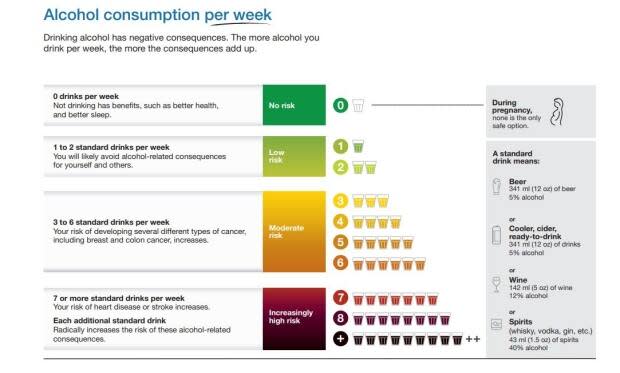N.L. needs to rethink its alcohol culture in wake of new consumption guidelines: Fitzgerald


Canada's new guidelines on alcohol consumption were a welcome sight for some medical professionals, says Dr. Janice Fitzgerald, Newfoundland and Labrador's chief medical officer of health.
Two weeks ago, the Canadian Centre on Substance Use and Addiction released its latest report on the dangers of drinking alcohol and its associated health risks.
"We were really quite happy to see this guidance come out. I really like the way they framed it as being guidance on alcohol and health," Fitzgerald said Monday.
"It's really informing people of the risks of alcohol to your health and hopefully allowing people to make some informed decisions about their alcohol consumption."
The report bluntly says no amount of alcohol is safe, and that not drinking has benefits including better health and better sleep. But for those who choose to drink, there is a breakdown of what the centre deems safe and dangerous.
Two drinks or fewer per week will likely avoid "alcohol-related consequences," according to the report, while three to six drinks per week runs the increased risk of developing several types of cancer, including breast and colon cancer. Seven drinks or more per week increases the risk of heart disease or stroke. Each additional drink "radically increases the risk of alcohol-related consequences."
Fitzgerald said health workers in the province are concerned about Newfoundland and Labrador's high levels of alcohol consumption. A 2019 report from the centre said N.L. consumes the most alcohol per capita among Canadian provinces.
"We want people to be able to make informed decisions, really, about how alcohol affects their health, and I think this guidance is quite clear and tells us there's quite a bit of evidence out there that says that any reduction in the amount of alcohol you consume can be beneficial to your health," she said.

Even if the risk of adverse effects is relatively low when a person has some alcohol, she said, the fact remains that alcohol is a carcinogen.
"I think it behooves us as health professionals and as public health professionals to inform the public of those risks because the public, I don't think, is aware that they could be putting themselves at risk with regard to cancers," she said.
"For some people, if there's family history or things like that, it may actually be the tipping point that makes them make a decision not to drink or drink significantly less."
In July, Newfoundland and Labrador released its provincial alcohol action plan, aimed at reducing alcohol harms and costs. The plan focuses on prevention, screening, brief intervention, referral and treatment and includes 13 actions to be completed by March 2026.
In a statement, Finance Minister Siobhan Coady said the provincial government is "always mindful of new research" and is focused on implementing the alcohol action plan.
Fitzgerald said the province needs to rethink its alcohol culture.
"[It's] not just about the amount you drink over an extended period of time but the amount that you drink in one sitting. These sorts of conversations are really important to have to think about how we change that culture."


